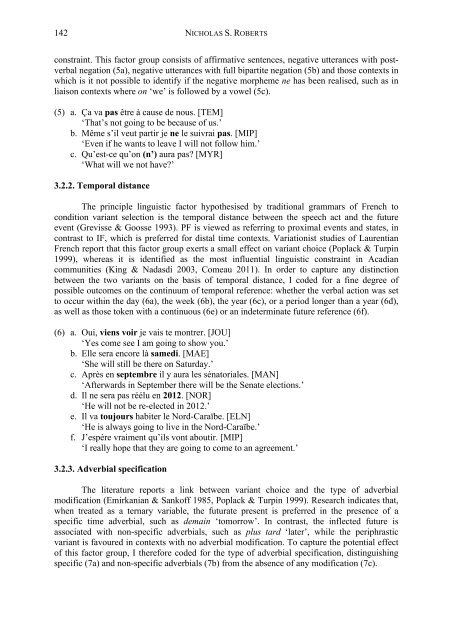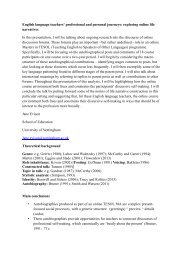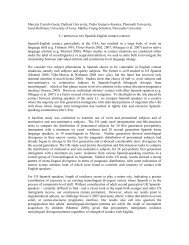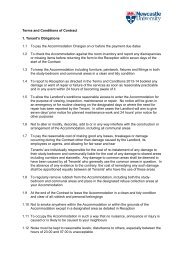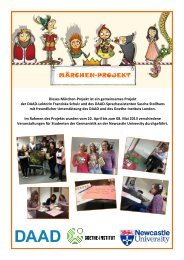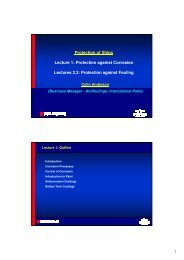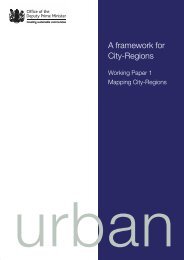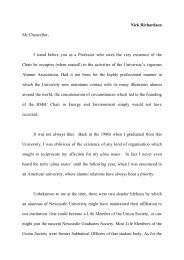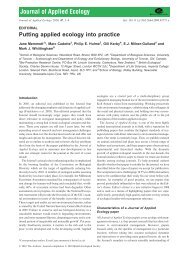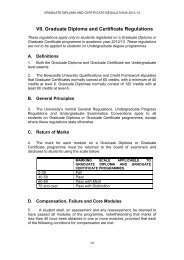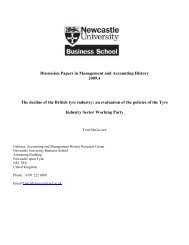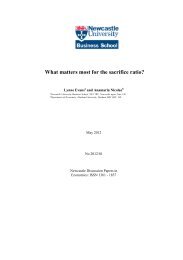the influence of linguistic factors on the expression of futurity
the influence of linguistic factors on the expression of futurity
the influence of linguistic factors on the expression of futurity
Create successful ePaper yourself
Turn your PDF publications into a flip-book with our unique Google optimized e-Paper software.
142<br />
NICHOLAS S. ROBERTS<br />
c<strong>on</strong>straint. This factor group c<strong>on</strong>sists <str<strong>on</strong>g>of</str<strong>on</strong>g> affirmative sentences, negative utterances with postverbal<br />
negati<strong>on</strong> (5a), negative utterances with full bipartite negati<strong>on</strong> (5b) and those c<strong>on</strong>texts in<br />
which is it not possible to identify if <str<strong>on</strong>g>the</str<strong>on</strong>g> negative morpheme ne has been realised, such as in<br />
liais<strong>on</strong> c<strong>on</strong>texts where <strong>on</strong> ‘we’ is followed by a vowel (5c).<br />
(5) a. Ça va pas être à cause de nous. [TEM]<br />
‘That’s not going to be because <str<strong>on</strong>g>of</str<strong>on</strong>g> us.’<br />
b. Même s’il veut partir je ne le suivrai pas. [MIP]<br />
‘Even if he wants to leave I will not follow him.’<br />
c. Qu’est-ce qu’<strong>on</strong> (n’) aura pas? [MYR]<br />
‘What will we not have?’<br />
3.2.2. Temporal distance<br />
The principle <str<strong>on</strong>g>linguistic</str<strong>on</strong>g> factor hypo<str<strong>on</strong>g>the</str<strong>on</strong>g>sised by traditi<strong>on</strong>al grammars <str<strong>on</strong>g>of</str<strong>on</strong>g> French to<br />
c<strong>on</strong>diti<strong>on</strong> variant selecti<strong>on</strong> is <str<strong>on</strong>g>the</str<strong>on</strong>g> temporal distance between <str<strong>on</strong>g>the</str<strong>on</strong>g> speech act and <str<strong>on</strong>g>the</str<strong>on</strong>g> future<br />
event (Grevisse & Goosse 1993). PF is viewed as referring to proximal events and states, in<br />
c<strong>on</strong>trast to IF, which is preferred for distal time c<strong>on</strong>texts. Variati<strong>on</strong>ist studies <str<strong>on</strong>g>of</str<strong>on</strong>g> Laurentian<br />
French report that this factor group exerts a small effect <strong>on</strong> variant choice (Poplack & Turpin<br />
1999), whereas it is identified as <str<strong>on</strong>g>the</str<strong>on</strong>g> most influential <str<strong>on</strong>g>linguistic</str<strong>on</strong>g> c<strong>on</strong>straint in Acadian<br />
communities (King & Nadasdi 2003, Comeau 2011). In order to capture any distincti<strong>on</strong><br />
between <str<strong>on</strong>g>the</str<strong>on</strong>g> two variants <strong>on</strong> <str<strong>on</strong>g>the</str<strong>on</strong>g> basis <str<strong>on</strong>g>of</str<strong>on</strong>g> temporal distance, I coded for a fine degree <str<strong>on</strong>g>of</str<strong>on</strong>g><br />
possible outcomes <strong>on</strong> <str<strong>on</strong>g>the</str<strong>on</strong>g> c<strong>on</strong>tinuum <str<strong>on</strong>g>of</str<strong>on</strong>g> temporal reference: whe<str<strong>on</strong>g>the</str<strong>on</strong>g>r <str<strong>on</strong>g>the</str<strong>on</strong>g> verbal acti<strong>on</strong> was set<br />
to occur within <str<strong>on</strong>g>the</str<strong>on</strong>g> day (6a), <str<strong>on</strong>g>the</str<strong>on</strong>g> week (6b), <str<strong>on</strong>g>the</str<strong>on</strong>g> year (6c), or a period l<strong>on</strong>ger than a year (6d),<br />
as well as those token with a c<strong>on</strong>tinuous (6e) or an indeterminate future reference (6f).<br />
(6) a. Oui, viens voir je vais te m<strong>on</strong>trer. [JOU]<br />
‘Yes come see I am going to show you.’<br />
b. Elle sera encore là samedi. [MAE]<br />
‘She will still be <str<strong>on</strong>g>the</str<strong>on</strong>g>re <strong>on</strong> Saturday.’<br />
c. Après en septembre il y aura les sénatoriales. [MAN]<br />
‘Afterwards in September <str<strong>on</strong>g>the</str<strong>on</strong>g>re will be <str<strong>on</strong>g>the</str<strong>on</strong>g> Senate electi<strong>on</strong>s.’<br />
d. Il ne sera pas réélu en 2012. [NOR]<br />
‘He will not be re-elected in 2012.’<br />
e. Il va toujours habiter le Nord-Caraïbe. [ELN]<br />
‘He is always going to live in <str<strong>on</strong>g>the</str<strong>on</strong>g> Nord-Caraïbe.’<br />
f. J’espère vraiment qu’ils v<strong>on</strong>t aboutir. [MIP]<br />
‘I really hope that <str<strong>on</strong>g>the</str<strong>on</strong>g>y are going to come to an agreement.’<br />
3.2.3. Adverbial specificati<strong>on</strong><br />
The literature reports a link between variant choice and <str<strong>on</strong>g>the</str<strong>on</strong>g> type <str<strong>on</strong>g>of</str<strong>on</strong>g> adverbial<br />
modificati<strong>on</strong> (Emirkanian & Sank<str<strong>on</strong>g>of</str<strong>on</strong>g>f 1985, Poplack & Turpin 1999). Research indicates that,<br />
when treated as a ternary variable, <str<strong>on</strong>g>the</str<strong>on</strong>g> futurate present is preferred in <str<strong>on</strong>g>the</str<strong>on</strong>g> presence <str<strong>on</strong>g>of</str<strong>on</strong>g> a<br />
specific time adverbial, such as demain ‘tomorrow’. In c<strong>on</strong>trast, <str<strong>on</strong>g>the</str<strong>on</strong>g> inflected future is<br />
associated with n<strong>on</strong>-specific adverbials, such as plus tard ‘later’, while <str<strong>on</strong>g>the</str<strong>on</strong>g> periphrastic<br />
variant is favoured in c<strong>on</strong>texts with no adverbial modificati<strong>on</strong>. To capture <str<strong>on</strong>g>the</str<strong>on</strong>g> potential effect<br />
<str<strong>on</strong>g>of</str<strong>on</strong>g> this factor group, I <str<strong>on</strong>g>the</str<strong>on</strong>g>refore coded for <str<strong>on</strong>g>the</str<strong>on</strong>g> type <str<strong>on</strong>g>of</str<strong>on</strong>g> adverbial specificati<strong>on</strong>, distinguishing<br />
specific (7a) and n<strong>on</strong>-specific adverbials (7b) from <str<strong>on</strong>g>the</str<strong>on</strong>g> absence <str<strong>on</strong>g>of</str<strong>on</strong>g> any modificati<strong>on</strong> (7c).


